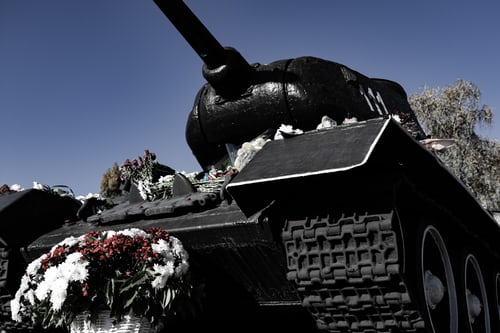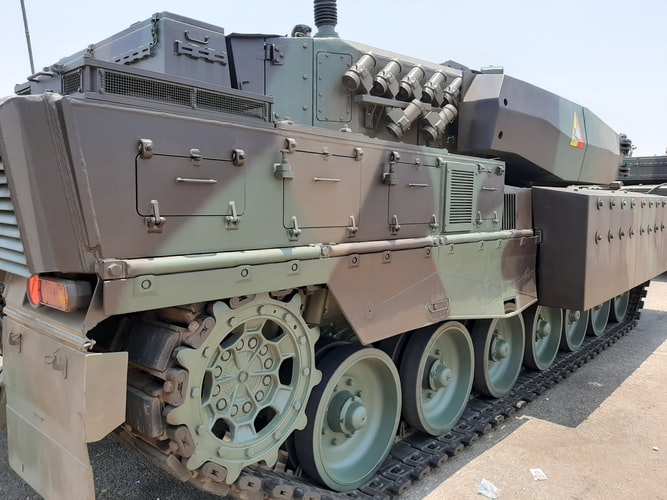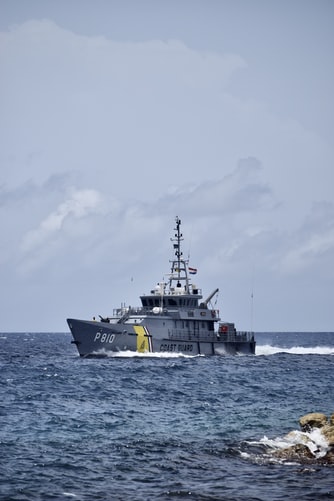The Collateral Damage of Iraq: Our Military’s Assault on the Environment
With the United States currently waging two wars against the threat of global terrorism, the planet’s environmental health has become the latest bystander struck down in the crossfire. The sheer immensity of the ongoing war effort in Iraq has produced a staggering amount of greenhouse gas emissions during the last decade.




While engaged in combat the military’s primary concern must always be the safety of its forces and the pursuit of victory. With that said, there are always methods to be tried and strategies to be devised which could easily reduce military emissions while also preserving the safety of our fighting forces. Our military stands ever ready to defend America’s interests, and as 2008 comes to a close, our national interests are increasingly linked to combating global climate change. The ability to wage war efficiently and effectively, while impacting the environment with minimal damage, should become the military’s mission. The impact of the military on the environment can be measured in two distinct ways. The first is an assessment of a war’s financial cost and an estimate of how those diverted funds could have been used towards environmental reform. For instance, it has been estimated that the projected total of U.S. spending on the Iraq war could cover all of the global investment in renewable energy development that is necessary between now and 2030 to reverse current warming trends.




Through a compilation of research on various emissions sources, such as “fuel-intensive combat, oil well fires and increased gas flaring, the boom in cement consumption due to reconstruction efforts and security needs, and heavy use of explosives and chemicals that contribute to global warming,” Oil Change International (OCI) estimated in March, 2008 that “the war in Iraq has is responsible for at least 141 million metric tons of carbon dioxide equivalent,” since combat operations began in March, 2003. For the sake of perspective, it should be noted that this amount of CO2 is the equivalent of adding 25 million more cars to U.S. roadways this year. The most disturbing finding in the OCI report suggests that, by measuring the war as an individual country in terms of emissions, it would emit more CO2 each year than 139 of the world’s nations do annually. The war effort would fall between New Zealand and Cuba, emitting more harmful greenhouse gases each year than 60% of all countries. So while the United States itself produces 22% of the planets emissions, leading the list of countries by a comfortable margin, it has also constructed a veritable ‘military nation’ in Iraq, one which currently pollutes at levels higher than half of the world. As Americans at home begin to conserve energy and change their habits in an effort to increase their “green” awareness, the American military is stationed overseas, polluting the land underfoot and the airspace above.

Transportation of troops and supplies, construction of bases and other facilities, rebuilding of damaged and destroyed infrastructure, and the fueling demands of a modern mechanized army have all contributed to the onslaught of harmful emissions. Even more distressing is the fact that military emissions are generally not included in overall estimates of environmental damage, which means they are largely unaffected by emission reform. This problem has presented perhaps the most distressing dilemma yet for the growing sustainability movement, simply because the efforts of our military are vital to our nation’s security. Unlike efforts to reduce the emissions produced by inefficient automobiles or wasteful energy consumption, it is difficult to argue against the necessity of some level of military emissions. This necessity has put environmental activists in a delicate quandary, forced to decide between their ideals and their allegiance. Whether or not you support the war itself, or our government’s motivations for entering into the conflict, it can be generally agreed that American troops under fire while defending their nation’s freedom should not be constrained or endangered by concerns over the harmful emissions they produce.



President Barack Obama pledged during his campaign to spend “$150 billion over 10 years to advance the next generation of green energy technology and infrastructure.” While this figure is impressive, it is important to note that the U.S. spends the same amount of money every ten months funding the Iraq war. Simply put, if America had decided against invading Iraq and instead utilized its ‘war chest’ to combat global climate change, the battle to save the planet could have already been won. Consider that, in 2006, the US spent more on the war in Iraq than the entire world invested in renewable energy research and development. This kind of misplaced priority, especially by a world power such as the United States, is inexcusable simply because the war in Iraq was not predicated on a legitimate threat to national security. Bearing in mind the monumental intelligence gathering failures which preceded the invasion of Iraq, there is a legitimate basis for questioning the government’s allocation of resources. This is especially true with mounting evidence confirming everyday the very real threat of global climate change, a threat which is far more pressing than any imagined weapons of mass destruction. The second measurement of military impact on the environment is more pragmatic, and is concerned solely with the actual damage done to the environment which can be attributed, directly or indirectly, to military operations.



Sources: All statistics provided by Oil Change International, the U.S. government’s Guide to Foreign Trade Statistics, and the Energy Information Administration.
URL: http://priceofoil.org/climateofwar/
URL: http://www.usatradeonline.gov/usatrade.nsf/vwRef/GuideTo
URL: http://www.eia.doe.gov/
Written By: Jonathan Zaun
Initiated & Edited by Thomas Thirion
On Behalf Of: Green Peace Corps

